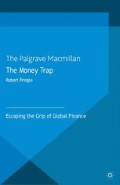Abstract
‘The market will not work effectively with monetary anarchy’, states James Buchanan, the Nobel Prize winning economist and a founder of the public choice school; economists should know that such anarchy can ‘only generate disorder’. This contrasts with the benefits of a constitutional order:
Within a regime of stability in property rights, contracts, and money, persons will interact, one with another, to generate an order that will produce and distribute value, as determined by their own choices, which they remain at liberty to take. (Buchanan, 2010, p. 251)
At the global level, we now have a state of monetary anarchy and it is producing the disorder of which Buchanan speaks. He focuses on the need, as he sees it, to ‘constitutionalize’ the US dollar; if the US did that, then other countries would continue to use the dollar as the international unit of account (p. 258). But his principal argument — insisting on the need to place money in a constitutional realm categorically separate from what he calls the Hobbesian state of anarchy — holds good for any attempt to construct an international standard for money. Sovereignty is exercised at two stages or levels — that which defines and enforces the constraints of a constitution and that which operates within the limits so defined.
To enable it to serve society properly, money itself should be restored to its true place in a constitutional realm above the cut and thrust of day-to-day politics.
Access this chapter
Tax calculation will be finalised at checkout
Purchases are for personal use only
Preview
Unable to display preview. Download preview PDF.
Bibliography
Brown, Brendan, Bubbles in Credit and Currency: How Hot Markets Cool Down, Palgrave Macmillan, 2008.
Buchanan, James, ‘The Constitutionalization of Money’, Cato Journal, Vol. 30, No. 2 ( Spring/Summer 2010 ). Copyright © Cato Institute.
Coyle, Diane, The Economics of Enough: How to Run the Economy as if the Future Really Matters, Princeton University Press, 2011.
Engels, Wolfram, ‘The Optimal Monetary Unity: Real Asset Currency, State Monopoly Sovereignty and the Private Issue of Bank Notes’, Campus Verlag, 1981.
Friedman, Milton, The Optimum Quantity of Money: And Other Essays, Aldine Transactions, 1969.
Gross, Bill, ‘Zero-based money keeps trapping recovery’, Financial Times, 6 February 2012.
Keynes, J. M., The General Theory of Employment, Interest, and Money. Macmillan & Co Ltd 1973, 1936.
King, Mervyn, ‘Banking: From Bagehot to Basel and Back Again’, 25 October 2010.
King, Stephen, ‘It’s Time to Re-Examine Inflation Targeting’, Financial Times, 13 February 2011.
Kotlikoff, Lawrence, Jimmy Stewart Is Dead–Ending the World’s Ongoing Financial Plague with Limited Purpose Banking. John Wiley and Sons, 2010.
Krugman, Paul, ‘How Much of the World is in a Liquidity Trap?’ New York Times, 17 March 2010.
Mallaby, Sebastian, More Money than God, Bloomsbury, 2010.
Author information
Authors and Affiliations
Copyright information
© 2014 Robert Pringle
About this chapter
Cite this chapter
Pringle, R. (2014). The Leap to a New Monetary Order. In: The Money Trap. Palgrave Macmillan, London. https://doi.org/10.1057/9780230392755_14
Download citation
DOI: https://doi.org/10.1057/9780230392755_14
Publisher Name: Palgrave Macmillan, London
Print ISBN: 978-1-349-35203-6
Online ISBN: 978-0-230-39275-5
eBook Packages: Palgrave Economics & Finance CollectionEconomics and Finance (R0)

